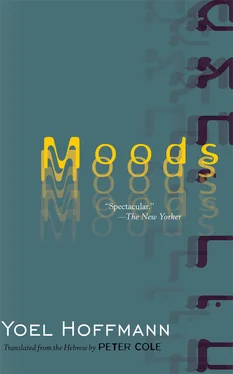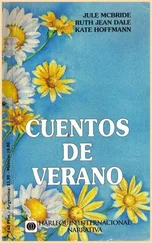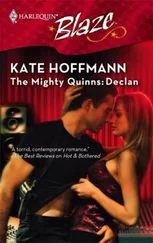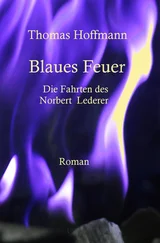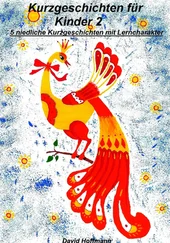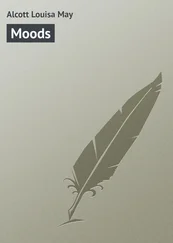Mr. Yellinek said Thank you very much and (because his head reached only to the chest of Mr. Nahmias) held out his hand toward Mr. Nahmias’s private parts. Mr. Nahmias shook the hand and said: It’s nothing. Then he gathered up the drill and the hammer and the screwdriver and the toolbox and went back to his apartment. Mr. Yellinek, on the other hand, stood there in front of his mailbox for a good long while.
[178]
In a previous life Mr. Yellinek was, no doubt, a pony and the mailbox a bale of hay or a water trough.
We’d like to come back as a bakery. As all that’s in it. As ovens. Fire. Loaves. So that our soul would become the soul of a bakery.
But our karma will undoubtedly take us in another direction. Most likely we’ll become a vole. Or, what’s it called? A broker (that is, on the stock market). Or a tragic historical figure.
Sometimes (mostly in dreams) we see something from our past lives. We were a pumpkin salesman at a market in Europe during the time of the Black Death or a Roman senator during the war with Carthage.
Once we had a nightmare. That we’d been reincarnated as ourselves and everything was happening for a second time. Step by step and word by word exactly as it had happened in our life, including our shoe size (9 1/2).
That’s why we like the way Jews bury their dead. The shrouds through which one can see the outline of the body. The sound of the corpse hitting the bottom of the hole. The prayer El Malei Rahamim — God, full of mercy. That absolute end and return to dust.
[179]
And that’s why happiness ascends from, of all places, cemeteries. No order is finer than that of those rows upon rows. And especially the great quiet, sometimes with just the sound of a hoe against the soil or the call of a crow.
Life itself should be lived like that. As in a silent film in which one sees only a single hut with a rooster strutting every so often from the left side of the screen toward the right, and a little while later coming back across it.
Once every thousand years or so a word will be heard. Like the sound of very distant thunder. A word like zoo or zero or zillion . Words, that is, which start with the final letter.
In this world there won’t be any information at all. That is, it won’t be possible to store anything. Memory will be something else entirely. More like a pane of transparent glass. And matter? Whatever you’d like it to be. But endless. One thing within another.
On second thought, even that word is superfluous. Perhaps the sound is sufficient. Something like the “A” that a tuning fork makes when the string instruments are being tuned. But only the “A.” Without the program or the concert that follows.
[180]
We’ve come to death and even to life that resembles death and the book’s still going on.
Maybe because we like to drink a certain kind of sherry. Not the kind they import to Israel, but another one. If we could remember what it was called, we’d ask our wine store to bring us a case of it.
We don’t want to say banal things about people we love, etcetera. We just want to say something about the wondrous nature of the heart. The muscle itself. That it’s stretched and contracted some seventy times a minute sixty minutes each hour and twenty-four hours a day three hundred and sixty-five days a year for maybe eighty years, and only the wizards of arithmetic can figure out how many beats that makes.
And, because we’re grateful to this muscle, wherever it comes from and wherever it’s going, it’s forbidden for us to die before our time and we need to observe all the commandments in the proper manner, such as, for instance, the one concerning the sherry.
And if we remember the name of that wine we’ll insist that the publisher order maybe eighty cases and distribute the bottles to bookstores, so that the readers can taste it.
[181]
We’d like to share all sorts of things with our readers. Not just wine.
For example, in Japanese, the syllable ka is like a question mark. You say something like “We’re going to Tokyo tomorrow.” But if you add a ka to the end of the sentence, the meaning changes to “Are we going to Tokyo tomorrow?”
The reader can read books that way. That is, as though there were a ka at the end of every sentence. The book would then be a long series of questions (among others about the sun and the moon and the stars) and we could call it The Book of Great Doubt . We could even call it The Book of Tremendous Doubt if we added the ka to the end of every word. But there’s no need to go that far.
In fact, faith is preferable to doubt. It’s better to read the book as though there were an exclamation mark at the end of every sentence. Or better still, as though each sentence were followed by those three letters that religious Jews are always adding to everything— bet, samekh, dalet (which stand for “with the help of God”) — and then we could call it The Book of Great Faith .
Imagine putting bet, samekh, dalet before every sentence and ka at its end. Then what?
[182]
These things are linked to Mr. Yellinek. We didn’t count him as one of our neighbors and then (when Mr. Nahmias fixed his mailbox for him) we spoke of him as though he were one.
The reader might ask himself: Is Mr. Yellinek a neighbor or not? Or worse, he could ask himself if Mr. Yellinek even exists.
But this is a question that shouldn’t be asked. Everyone exists. Especially Mrs. Shtiasny and her Italian husband. If you start casting doubt on this or that character you’ll need, at the end of the day, to doubt the existence of all the characters — even the author himself (that is, Yoel Hoffmann), and worse still, yourself.
And so, Mr. Yellinek exists exactly as Mrs. Shtiasny exists and as her Italian husband exists. You can see him here and there (mostly in Tel Aviv) standing in front of mailboxes.
Generally speaking. The word exists is an ugly word. At most it might suit a kind of screw but not all of creation. And if our readers insist on using it, they should at least write it with a ks instead of an x .
[183]
January two thousand and nine. During the war we inhale the air that we exhale and not new air. Our dark father, who stands behind our biographical father, gives birth to us.
In this way too mankind goes astray. It gathers up information all the time like a mad quartermaster, but during a war even the mad go mad.
When we were soldiers we never managed to get things straight and polish what was supposed to be polished. Our steel helmet rocked from side to side, our backpack slipped off of our shoulders, our canteen got dirty, and the rifle was never properly calibrated. Our dark father accompanied us wherever we went and our mother was far away or dead.
There was always someone very short (shorter even than Mr. Yellinek) who made everyone laugh. Mostly his name was Yirmiyahu but everyone called him Yirmi and every once in a while Yahu. What was so funny about him? For instance, he stuffed his ammunition pouch not with extra rounds but with cans of sardines and slabs of cheese. He was the one who’d light the fire and then piss on the coals before we left. Everyone had a girlfriend (or everyone said they did) and he was the only one who didn’t. But he had some thingamajig that he loved. A pocketknife or a large marble or a pen on which a naked woman rose and fell.
[184]
The German word for war is krieg, and it’s a word that suits a kind of cracker (or rusk) and not the shedding of blood. Francesca, my stepmother, sometimes said krieg but, because of her build, it sounded different.
Generally, a word depends on who says it. Think, for example, of the philosopher Yeshayahu Leibowitz and Mary, the Holy Virgin. We’re having a hard time thinking of a word that both might have uttered, but it’s clear that if they said that word, in each case we’d imagine something completely different.
Читать дальше
